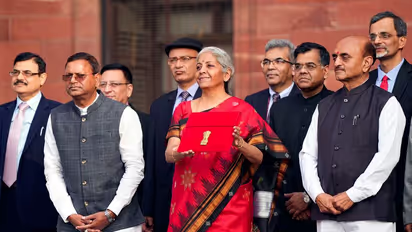Opinion: Budget 2023 bets more on investment, less on populism

Synopsis
While the Budget should boost investment-led growth, the consumption-driven lead through the 'Revenue Foregone' of Rs 35,000 crore to the income taxpayers and other tinkering in customs etc, may not be good enough for the objective, says Prakash Chawla
The government has sought approval from Parliament for a total expenditure of Rs 45 lakh crore in 2023-24, as per the Budget estimates presented by Finance Minister Nirmala Sitharaman. Of this total spend, Rs 10 lakh crore has been provided for the capital expenditure -- three times more than government capex in 2019-20 on infrastructure like railways, ports, roads, airports, telecom and defence modernisation.
Also Read: Decoding where Budget 2023 delivers... and disappoints
This way, almost one-fourth of the public expenditure would be towards the infrastructure build-up, a sign of a quality Budget. This is a standout feature of the Budget which, contrary to wide expectations, shuns populism other than already built into the system over the years. Even as the last regular Budget before the general elections of 2024, it is more of a 'business-like' approach rather than a political outreach to the voters. Such an approach is a welcome departure from the expected line.
"This substantial increase in recent years is central to the government's efforts to enhance growth potential and job creation, crowd-in private investments, and provide a cushion against global headwinds," Sitharaman emphasised. She is right; this approach has helped India weather the global storm after the outbreak of Covid-19 in 2020 and the adverse impact of the Ukraine-Russia war choking the supply chain for critical industries, sending energy prices to levels causing anxiety to the importing nations.
The government would end up spending Rs 7.28 lakh crore in the current financial year itself, a welcome trend that was ushered in after the global turmoil of 2020 and continues to date. Good, the Narendra Modi government did not fall to the temptation of a populist Budget in the run-up to the 2024 Lok Sabha elections.
Public investment would be leading India's growth in the range of 6.5-7 per cent, even in times of global uncertainty. However, the Finance Minister's expectations of the crowd in the private sector may not be realised at least in the next three quarters given the fact the capacity utilisation in most of the sectors is still below 75 per cent or so and the corporate balance sheets have still not been deleveraged.
The entire infrastructure story, at least in the private sector, is being built on high leverage, which has come under scrutiny, at least for one of the biggest players hogging the limelight for the wrong reasons. So, it is going to be quite a while before big-time private sector investment pours in; till such time, the heavy lifting has to be done by the government itself.
Fortunately, despite the challenges of inflation and global slowdown, the current FY'23 has witnessed a tax buoyancy. The Budget is expecting the buoyancy to continue in 2023-24 on the assumption that the GDP in nominal terms (without factoring in inflation) would be above 10 per cent. The gross tax receipts for FY'24 have been pegged at Rs 33.60 lakh crore, from the Revised Estimates of Rs 30.43 lakh crore, which in itself was significantly way up from the Budget Estimates of Rs 27.57 lakh crore for FY'23. Let us hope the Indian economy faces tailwinds rather than headwinds resulting in revenue buoyancy for the government.
While the Budget should boost investment-led growth, the consumption-driven lead through the 'Revenue Foregone' of Rs 35,000 crore to the income taxpayers and other tinkering in customs etc., may not be good enough for the objective. The tax concessions through exemptions could have been more generous given a kind of tax buoyancy as expected in the Budget. After all, the gross tax collections are projected to increase by over Rs 3 lakh crore, against which the sops being provided are only Rs 35,000 crore. Thus, the Budget is betting more on investment rather than consumption, expecting returns in the form of job creation.
The author is a New Delhi-based independent economic analyst and journalist.
Also Read: Budget 2023 Income Tax slabs explained: Who will pay zero tax; what if your salary is Rs 9 lakh
Stay updated with all the latest Business News, including market trends, Share Market News, stock updates, taxation, IPOs, banking, finance, real estate, savings, and investments. Track daily Gold Price changes, updates on DA Hike, and the latest developments on the 8th Pay Commission. Get in-depth analysis, expert opinions, and real-time updates to make informed financial decisions. Download the Asianet News Official App from the Android Play Store and iPhone App Store to stay ahead in business.